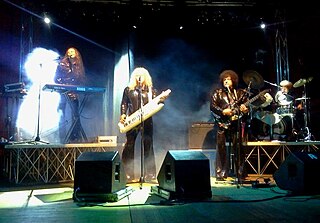
I Cugini di Campagna is an Italian pop band formed in 1970 in Rome. They are well known for the use of falsetto and for their eccentric look, a cross between glam and kitsch.
Heather Elizabeth Parisi is an American-born Italian dancer, singer and television personality. She was one of the most popular personalities on Italian television from the late 1970s to the 1990s. As of 2011, she and her family mainly live in Hong Kong.
"Vecchio frac" is a 1955 song written by Italian singer-songwriter Domenico Modugno.

"Nel sole" is a song composed by Al Bano, Pino Massara and Vito Pallavicini, and performed by Al Bano. The song marked his first commercial success, and launched his career as a singer. The single peaked at first place four weeks on the Italian hit parade and sold about one million and half copies. The song named a film, Nel sole, directed by Aldo Grimaldi and starred by the same Al Bano and his then-wife Romina Power.

"Zingara" is a song composed by Enrico Riccardi and Luigi Albertelli. The song won the nineteenth edition of the Sanremo Music Festival 1969, with a double performance by Bobby Solo and Iva Zanicchi. The Solo's version peaked at first place for two weeks on the Italian hit parade.

Fabio Concato is an Italian singer-songwriter.
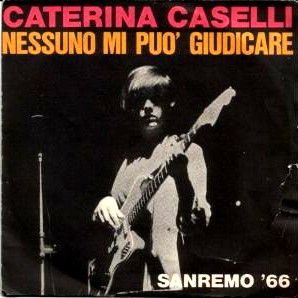
"Nessuno mi può giudicare" is an Italian pop song written by Luciano Beretta, Miki Del Prete, Daniele Pace and Mario Panzeri. The song premiered at the sixteenth edition of the Sanremo Music Festival, and was performed by Caterina Caselli and Gene Pitney, finishing second.

"Perdono" is an Italian pop song written by Piero Soffici and Mogol and performed by Caterina Caselli.

Domodossola, also spelled as I Domodossola, was an Italian pop band, active between 1969 and 1977.

"Adesso sì" is a 1966 Italian song composed by Sergio Endrigo. The song premiered at the 16th edition of the Sanremo Music Festival, with a double performance by Endrigo and Chad & Jeremy, and placed eight in the competition.

"Applausi" is a 1968 song composed by Claudio Cavallaro and Luciano Beretta and performed by the musical group I Camaleonti. One of the band's major hits, the song consists of the alternating between soul-style vocal cues and choral moments.

"Il nostro concerto" is a 1960 Italian song composed by Umberto Bindi (music) and Giorgio Calabrese (lyrics). The song premiered at the Italian Music Festival in New York, in which was performed by Miranda Martino and placed third. It eventually was Bindi's major hit, whose version topped the Italian hit parade for several months.
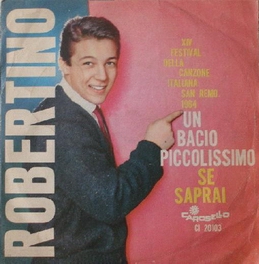
"Un bacio piccolissimo" is a 1964 song composed by Giovanni Ornati and Gino Mescoli. The song premiered at the 14th edition of the Sanremo Music Festival with a double performance of Robertino and Bobby Rydell. Robertino's version was sung with a fake English accent according to the fashion of the time.

"E la luna bussò" is an Italian reggae ballad written by Mario Lavezzi, Oscar Avogadro and Daniele Pace and performed by Loredana Bertè. One of Bertè's major hits, it stayed on the Italian Singles Chart for 29 weeks.
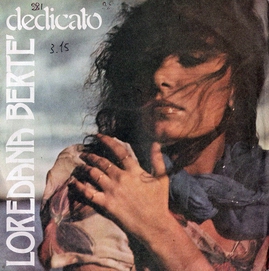
"Dedicato" ("Dedicated") is an Italian R&B ballad written by Ivano Fossati and performed by Loredana Bertè. It was the first Bertè's single entering the top ten on the Italian hit parade.
Mario Panzeri was an Italian lyricist and composer. He is well known for his composed songs that include "Maramao perché sei morto?" "Pippo non lo sa", "Lettera a Pinocchio", and "Grazie dei fior", which won the first edition of the Sanremo Music Festival in 1951.
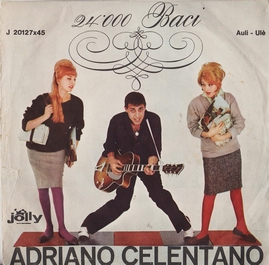
"24.000 baci", also spelled "24 mila baci", is a 1961 song composed by Ezio Leoni, Piero Vivarelli, Lucio Fulci, and Adriano Celentano. The song premiered at the 11th edition of the Sanremo Music Festival with a double performance of Adriano Celentano and Little Tony, and placed at the second place. It is regarded as the first rock and roll song to enter the competition at the Sanremo Festival. During his performance, Celentano created a large controversy for performing part of the song with his back to the public.

"Nessuno" is a 1959 Italian song composed by Antonietta De Simone and Edilio Capotosti. The song premiered at the ninth edition of the Sanremo Music Festival, with a double performance by Wilma De Angelis and Betty Curtis, and placed at the eighth place.

"Piccolo uomo" is a 1972 Italian song composed by Dario Baldan Bembo (music), Bruno Lauzi and Michelangelo La Bionda (lyrics) and performed by Mia Martini. It was the singer's first significant commercial success.
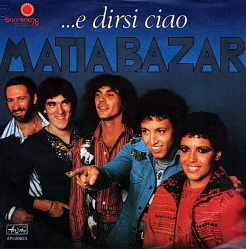
"...e dirsi ciao" is a 1978 song composed and performed by the Italian pop group Matia Bazar. It won the 28th edition of the Sanremo Music Festival.
















